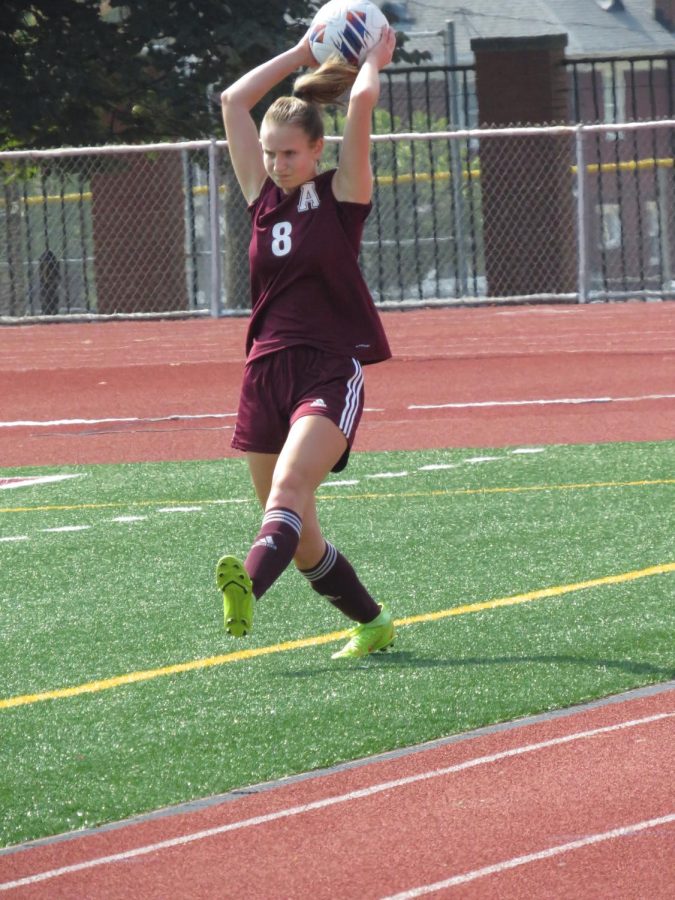Girls’ soccer team lacks junior varsity team
Sophomore Lia Sankey throws the ball back into the game. Lia has been playing soccer for 11 years.
September 23, 2022
This year the girls’ soccer team is lacking a junior varsity team.
According to girls’ soccer coach, Ralph Winterburn, one effect this has on the team is that there are not enough players to play an 11 on 11 scrimmage.
“We still scrimmage at the end of a training session, but in years past, I’ve always had enough to do a full sides scrimmage, but this year, we just don’t have enough. That’s probably been the biggest change this year without having a JV [junior varsity] team,” Winterburn said.
The reason there is no junior varsity team is due to the fact of not having enough players. According to Winterburn, within the last two years, 20 girls have graduated, and only seven freshmen have joined.
“It’s just a numbers game; we didn’t have enough. Total roster for this year is 22, and we have two players who are out all year due to injuries from the spring. Then we have another one who’s just getting ready to be cleared, and then another one to follow the week after,” Winterburn said.
Senior Delainey Wisor believes that adding a JV team would be beneficial.
“Having a JV team allows girls to showcase their abilities and compete for a spot on the varsity lineup. It allows the players who don’t get much playing time on varsity to see the field and display their talents,” Wisor said.
Winterburn prefers to have 28 players in order to have both a junior varsity and varsity team that way 14 players can be on each team. He also believes that having 28 players will lower the risk of a player getting injured.
“It’s unfair to ask those players who just played 80 minutes in a varsity game to play in the JV game. Then you kind of get into the risk factor of is it really worth it because then those players who are playing those amount of minutes could fall to injury,” Winterburn said.
“Having a JV team this year would be difficult because we don’t have the numbers. We can’t afford for girls to get hurt; however, if we had the numbers, I truly believe there are no downsides,” Wisor said. “It has definitely changed how practices are run because we are so low on numbers. It’s been difficult for us to scrimmage in an 11 on 11 atmosphere and make game-like scenarios. We mostly utilize shortsided drills up until game day.”
Winterburn admits that having a junior varsity team would be beneficial because there would be more players, and it would lower the risk factor of the players getting injured.
“I’ve always loved having a JV team for a bunch of different reasons. All the players who didn’t get to play in the varsity game can play in the JV game, or we actually use it for development. If we were looking at someone for a different position for varsity, sometimes we’ll play them for some minutes in JV just so we can see and coach them through it, and it’s a lot easier when we do that for them to make the change on the varsity level,” Winterburn said.
All throughout high school, Winterburn played soccer, and believes he always had good coaches who had an impact on his life. Winterburn wanted to be a coach to give back those relationships.
“I think that’s the biggest determining factor of why I’m a coach is just to make those relationships with the girls and give them a positive influence in their life outside of school, and hopefully along the way teach them some life lessons that will help them as they graduate,” Winterburn said. “The nurse at my wife’s elementary school said the soccer position was open and that I should apply for it: so I applied for it. My first four years of coaching, I coached at the junior high then the varsity position opened, I applied for it, interviewed for it, and I got that one.”
Winterburn coached for eight years before taking over the high school program; he had goals in mind. He wanted to change the culture and the image of the soccer program. He also wished to win a District Championship.
“It’s kind of cool to look back and notice that we have changed all those things. Before I took the program over, I think they had three winning seasons in 20 years. We haven’t had a losing season since I’ve been there. We’ve been able to win three District Championships. We’ve been able to put a lot of girls into college. I’ve formed a lot of really good relationships, and I think the girls are happy at the end of the four years when they leave the program. So, at the end of the day, that’s a success,” Winterburn said.
Wisor has been playing soccer since she was three years old.
“Soccer has completely shaped who I am; it has taught me the importance of sportsmanship, competitiveness and work ethic. If it weren’t for soccer, I wouldn’t have met some of my best friends either,” Wisor said.
Winterburn recently brought in a friend of his who played at the naval academy for four years; she was at the professional level for four years with the Houston Dash, and she was a goalkeeper coach for the Afghan national team. He believed it was easier for the girls to take coaching points from her then from him.
“At times, I have to watch because I teach baseball as well. I don’t yell at the girls, but I change my tone every now and then. A lot of things are more conversations instead of me yelling or barking orders like I do in baseball. Just because with girls, whether I like it or not, if I’m just yelling at them one of two things is going to happen. Number one, I’m the biggest jerk in the world, so they’re not going to do what I’m telling them to do or number two, they get upset, and they think that I don’t like them or I’m mad at them or whatever it could be. I try to make everything more of a conversation. You can phrase somebody not playing very well in a conversation, and you can get the same point across if you yell at them. The conversation seems to work a lot better; that’s one thing I learned fairly quickly,” Winterburn said.









